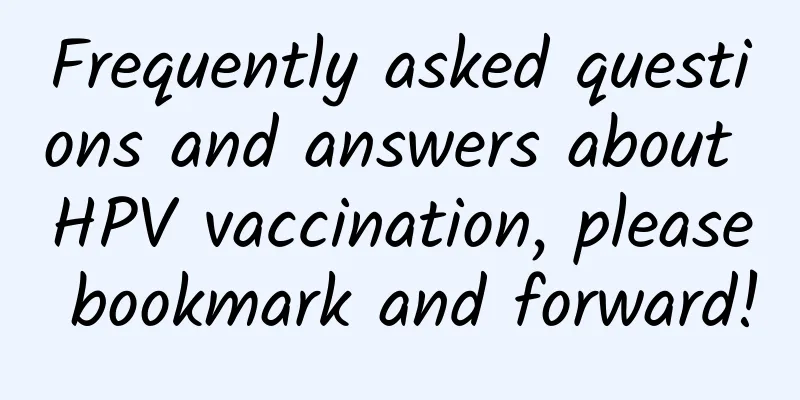Frequently asked questions and answers about HPV vaccination, please bookmark and forward!

|
According to statistics from the World Health Organization, there were approximately 604,000 new cases of cervical cancer and 342,000 deaths worldwide in 2020; among them, there were 109,700 new cases and 59,000 deaths in my country. Cervical cancer is currently the only malignant tumor with a clear cause, mainly caused by human papillomavirus (HPV) infection. HPV vaccination is considered to be the most economical and effective means of preventing cervical cancer. Getting the HPV vaccine as early as possible to prevent it is the most important step in eliminating cervical cancer. So how much do you know about the HPV vaccine, and how can you get the HPV vaccine scientifically? Below, we will give you a detailed answer, and we recommend you collect and forward it. Q What are the HPV vaccines on the market in my country? A HPV vaccines are all inactivated vaccines, and are divided into three categories: bivalent, quadrivalent, and nonavalent. The bivalent HPV vaccine can prevent cervical cancer and related precancerous lesions caused by HPV virus infection with genotypes 16 and 18 (accounting for about 70% of all cervical cancer cases). How to choose between different HPV vaccines? A There is no difference between the bivalent, quadrivalent and nine-valent vaccines in terms of immunogenicity, efficacy and effectiveness in preventing HPV16/18-related cervical cancer. Different cervical cancer vaccines are suitable for people of different ages and have different prices. You can choose the appropriate vaccine for vaccination according to your needs. The key to preventing cervical cancer is not to get the expensive vaccine, but to get vaccinated as early as possible to protect yourself from HPV virus infection. When is the HPV vaccine most effective? A The HPV vaccine is most effective when it is administered before exposure to the HPV virus. Since infection with human papillomavirus usually occurs shortly after the first sexual activity, HPV vaccination at ages 9-14 provides the best protection. Regardless of whether there is HPV infection, HPV vaccination is recommended for women aged 9-26 years old, and HPV vaccination is recommended for women aged 27-45 years old who are eligible. How long does the HPV vaccine protect me? Do I need a booster? A Existing research data show that the protection obtained after HPV vaccination can last for at least 8-10 years, and there is no evidence that protection will be lost after vaccination. It is currently believed that a three-dose immunization program can achieve a good immune effect, and booster vaccination is not recommended. Will I not get cervical cancer if I get the HPV vaccine? A The protection rate of any vaccine is not 100%, and the virus types covered by the vaccine are limited. Therefore, even if you are vaccinated, you still need to cooperate with regular screening to detect early cervical lesions in time. Women over 20 years old or who have had sexual intercourse for more than 3 years are recommended to undergo cervical cancer screening once a year. Vaccination plus regular cervical cancer screening is the best strategy to prevent cervical cancer. Q How safe is the HPV vaccine? What are the common adverse reactions after vaccination? A Based on the current vaccination situation, the World Health Organization believes that the three HPV vaccines currently on the market have good safety. Adverse reactions after HPV vaccination are mostly mild reactions such as fever, fatigue, dizziness, or pain, redness, swelling, and nodules at the injection site. Generally, no special treatment is required and they can be relieved on their own. Individuals with severe symptoms should seek medical attention in a timely manner. Q What should I do if I missed the vaccination time? A If vaccination is not completed on time due to special circumstances, as long as you are within the age limit, you can continue with vaccination and complete the remaining doses without starting the vaccination again, but early vaccination is not recommended. Q Can I get the HPV vaccine after getting the new coronavirus vaccine? A Yes, but there should be a certain interval between the two. It is not recommended to vaccinate the new coronavirus vaccine and the HPV vaccine at the same time. According to the "Technical Guidelines for Vaccination of New Coronavirus Vaccines (First Edition)", the interval between the HPV vaccine and the new coronavirus vaccine is more than 14 days. Q Can I get the HPV vaccine during menstruation, breastfeeding, or pregnancy? A Menstrual period: Menstrual period is not a contraindication for HPV vaccination and HPV vaccination can be received. Lactation period: It is recommended to wait until the end of the lactation period before vaccination. Pregnancy: Avoid vaccination. If a woman is already or is planning to become pregnant, it is recommended to postpone or interrupt the vaccination process and get vaccinated after the pregnancy is over. Q What should you pay attention to during HPV vaccination? A It is recommended to avoid eating known allergic foods during HPV vaccination; because some women have varying degrees of menstrual discomfort, it is recommended to vaccinate during non-menstrual period; acute diseases are often accompanied by systemic symptoms such as fever, and vaccination may aggravate symptoms, so it is recommended to vaccinate after recovery. Reference: "Action Plan to Accelerate the Elimination of Cervical Cancer (2023-2030)" Source | Jiangxi Disease Control and Prevention |
Recommend
Is the ovulation date fixed every month?
Generally speaking, for healthy women, the ovulat...
Why don't you have labor pains after your water breaks?
Water breaking is a problem that mothers will enc...
How to choose cold medicine? Don’t just know about Sina Weibo and Ibuprofen!
Influenza is an acute respiratory infectious dise...
Can I go out after three days of painless abortion?
Although painless abortion is a minor operation, ...
Best time for cesarean section
There is a big difference between a cesarean sect...
How to drink motherwort during menstruation
Motherwort is not unfamiliar to many women, espec...
Can women drink Laozao after caesarean section? Is there any harm?
After choosing a cesarean section, the damage to ...
What should pregnant women with low blood pressure eat to replenish blood?
What should pregnant women with low blood pressur...
What is the best time to have a painless abortion?
People's ideas are more advanced now than bef...
How to choose crabs correctly? Can I drink monk fruit after eating crabs?
Crabs are rich in high-quality protein, minerals,...
Is there blood in the leucorrhea and back pain caused by inflammation?
Gynecological inflammation is the most annoying t...
Do cereals contain high-quality protein? How do vegetarians consume protein?
Protein is an important component of all cells an...
Cervical insufficiency is effective in bed rest
Cervical insufficiency is also known as incomplet...
What is the approximate range of endometrial thickness after childbirth?
With the progress of the times, people's phys...
"Although it's not easy, it's maintainable." How can people with COPD improve their quality of life?
After winter, Lao Cui's life has become incre...









